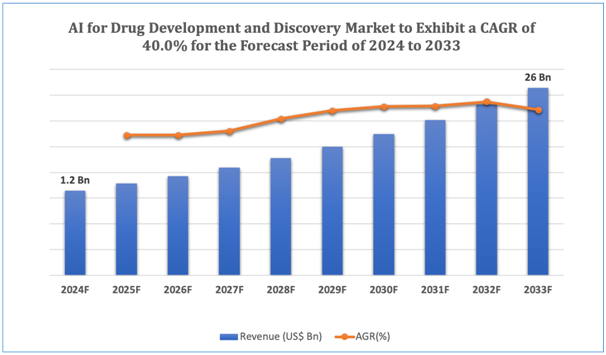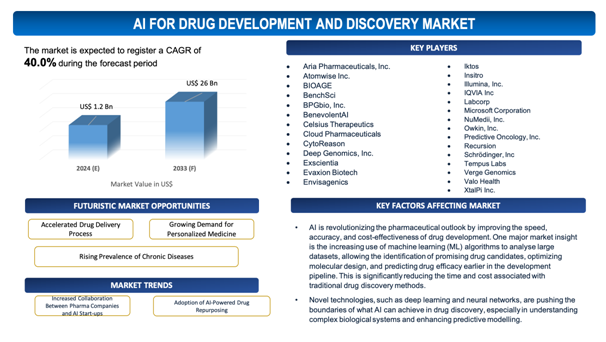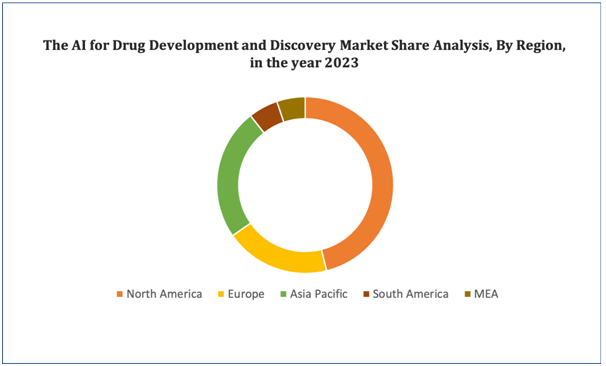AI for Drug Development and DiscoveryMarket Overview
The global AI for drug development and discovery market is estimated to be worth over USD 26Bn in 2033 and is expected to grow at CAGR of40.0% during the forecast period (2024-2033).
Artificial Intelligence (AI) is witnessing drug development and discovery, significantly transforming the healthcare landscape. Conventionally, the procedure of discovering new drugs has been time-consuming, expensive, and often inefficient, necessitating years of research, clinical trials, and massive investments. AI is transforming this by improving efficiency, boosting timelines, and minimizing costs. By evaluating vast datasets, AI allows researchers to determine potential drug candidates more quickly, predict outcomes with higher accuracy, and optimize drug design through sophisticated modelling and simulations.
AI’s capability to process vast amounts of biological and chemical data in a fraction of the time that conventional methods require enables for the identification of new drug compounds, understanding disease mechanisms, and forecasting how drugs will interact with the human body. Machine learning algorithms can screen millions of compounds, predict drug efficiency, and detect molecules with the highest potential for success, streamlining the initial stages of drug discovery. This not only reduces time-to-market but also reduces the high failure rates typically seen in the development pipeline.
AI is also revolutionizing personalized medicine by allowing more targeted drug discovery efforts. By analysing patient data such as genetic information, medical history, and biomarkers, AI aids develop treatments tailored to individual patient profiles, increasing the likelihood of successful outcomes. This move toward personalized therapies is especially crucial in fields like oncology, where precision medicine is becoming the standard for effective treatment.
Latest advancements in natural language processing (NLP) are allowing AI systems to sift through vast amounts of scientific literature and clinical data, identifying trends and insights that would otherwise go unnoticed. In addition, AI-driven drug repurposing has shown promise, allowing researchers to identify novel uses for existing drugs, which can substantially minimize development costs and time.
Overall, AI is redefining drug development by enhancing accuracy, speed, and cost-effectiveness, making it a transformative force in healthcare. As AI continues to evolve, it holds the potential to unlock groundbreaking treatments, propels the drug development process, and ultimately enhance patient care and outcomes on a global scale.
Figure 1. AI for Drug Development and Discovery: Market Size

Get more details on this report - Request Free Sample
Key Market Insights
The global AI for drug development and discovery market is witnessingswift growth, fuelled by the need for faster, more efficient drug discovery processes and the incorporation of leading-edge technologies. AI is revolutionizing the pharmaceutical outlook by improving the speed, accuracy, and cost-effectiveness of drug development. One major market insight is the increasing use of machine learning (ML) algorithms to analyse large datasets, allowing the identification of promising drug candidates, optimizing molecular design, and predicting drug efficacy earlier in the development pipeline. This is significantly reducing the time and cost associated with traditional drug discovery methods.
Significant developments in the market comprise the surge of AI-driven drug repurposing, which includesdetecting new therapeutic uses for existing drugs, potentially saving years of research and development. Companies are leveraging natural language processing (NLP) to evaluate scientific literature and clinical trial data, extracting valuable insights that improve research precision. AI-based virtual screening platforms are also gaining momentum, allowing researchers to simulate drug interactions and predict biological activity without the necessity for physical testing, thus boosting early-stage drug discovery.
Novel technologies, such as deep learning and neural networks, are pushing the boundaries of what AI can achieve in drug discovery, especially in understanding complex biological systems and enhancing predictive modelling. As more pharmaceutical companies and biotech firms adopt AI technologies, the market is poised for sustained expansion, offering substantial potential to transform drug development and bring advanced therapies to patients faster than ever before.
Market Dynamics
Market Drivers
Accelerated Drug Delivery Process
The accelerated drug discovery process is a significant market driver for the global AI for drug development and discovery market, offering majorbenefits over conventional methods. In traditional drug discovery, the process of detecting and developing new drugs can take over a decade and needssignificant financial investment, often with a high failure rate. AI is revolutionizing this by substantiallyminimizing the cost, time, and complexity involved. Through advanced algorithms, AI can assesslarge datasets, comprising genomic information, molecular structures, and clinical trial results, to determine potential drug candidates more effectively.
AI allows virtual screening of millions of compounds in a fraction of the time it would take using manual methods, quickly narrowing down the most promising drug candidates for further testing. In addition, AI can predict how these compounds will interact with biological targets, enhancing the accuracy of preclinical predictions and minimizing the number of compounds that fail during clinical trials. This improved predictive power results in fewer trial-and-error experiments and faster movement from discovery to clinical stages.
Furthermore, AI-driven drug repurposing aids identify novel therapeutic uses for existing drugs, further speeding up the process by enabling companies to bypass early development stages. This expedited approach not only shortens the timeline for bringing new therapies to market but also lessens research and development costs, making it a robust driver in the global market as pharmaceutical companies and biotech firms progressively adopt AI technologies to stay competitive in the rapidly evolving drug development landscape.
Market Restraints
With regard to numerous advantages of AI for drug development and discovery, the market faces several challenges due to the unique characteristics and requirements associated with these potent pharmaceutical products. Some of the key market challenges include:
- High Implementation Costs: The incorporation of AI technologies into drug development processes needssignificant investment in infrastructure, data management systems, and specialized talent. These increased initial costs can be a notable barrier, especially for smaller pharmaceutical and biotech companies, deterring widespread adoption of AI-driven solutions in the market.
- Data Privacy and Security Concerns: The usage of massive datasets, comprising sensitive patient information and proprietary research data, raises concerns around data privacy and security. Strict regulations, such as GDPR and HIPAA, need stringent compliance measures, and any breach of these regulations can result in costly penalties and damage to reputation. These concerns can slow the adoption of AI in drug discovery, particularly in regions with rigorous data protection laws.

Get more details on this report - Request Free Sample
Market Opportunity
Growing Demand for Personalized Medicine
The increasing demand for personalized medicine represents a significant market opportunity for the global AI for drug development and discovery market. Personalized medicine aims to customize treatments based on an individual’s genetic makeup, lifestyle, and environmental factors, resulting in more effective and targeted therapies. AI holds anessential role in this by allowing the assessment of large amounts of patient data, comprising genomic information, medical history, and biomarkers, to determine patterns and correlations that would be hard to detect using conventional methods.
By leveraging AI, researchers can develop precision therapies that are designed to work optimally for specific patient populations or even individuals, enhancing treatment outcomes and reducingside effects. This approach is especially valuable in fields such as oncology, where personalized treatments are becoming crucial for addressing the intricate nature of cancer. AI can also propel the identification of genetic mutations or variations that may influence how a patient responds to certain drugs, enabling for the development of customized treatment regimens.
As the demand for personalized medicine continues to rise, pharmaceutical companies are progressively turning to AI-driven platforms to improve their drug discovery efforts. The capability to create targeted therapies not only enhances patient care but also opens up new revenue streams, as AI allows the development of more effective, patient-specific drugs. This increasing trend presents a lucrative opportunity for AI-driven innovation in drug development, as healthcare systems globallyshift toward more individualized approaches to treatment.
Market Trends
- Increased Collaboration Between Pharma Companies and AI Start-ups: Pharmaceutical companies are progressively partnering with AI-focused start-ups to incorporateleading-edge technologies into their drug discovery processes. These collaborations combine the expertise of AI firms in data analysis and machine learning with the pharmaceutical industry's large biological and clinical data, propelling the development of new drug candidates and improving the efficacy of R&D efforts.
- Adoption of AI-Powered Drug Repurposing: AI-driven drug repurposing is gaining momentum as a cost-effective and time-saving trend in drug development. By evaluating existing drugs' molecular and clinical data, AI systems can determinenovel therapeutic applications for these compounds. This approach reduces the need for extensive preclinical trials, offering a faster route to market while lowering R&D costs, making it a soaring trend within the industry.
AI for Drug Development and Discovery Market: Key Segments
By Offering
- Software
- Services
By Technology
- Machine Learning
- Deep Learning
- Supervised Learning
- Unsupervised Learning
- Reinforcement Learning
- Other Machine Learning Technologies
- Context-Aware Processing
- Natural Language Processing
- Others
By Therapeutic Area
- Oncology
- Infectious Diseases
- Neurology
- Metabolic Diseases
- Cardiovascular Diseases
- Immunology
- Other Therapeutic Areas
By End Use
- Contract Research Organizations (CROs)
- Pharmaceutical and Biotechnology Companies
- Research Centers and Academic Institutes
- Others
By Key Geographical Regions
- North America
- Europe
- Asia-Pacific
- Middle East and Africa
- South America
Figure 4. AI for Drug Development and Discovery Market: Distribution by Region

Get more details on this report - Request Free Sample
AI for Drug Development and Discovery Market: Regional Analysis
North America is expected to dominate the artificial intelligence (AI) in drug discovery market, driven by substantial research investments and widespread AI adoption in medicine development. Key players such as IBM, Google, and Microsoft strengthen the region's influence and technological advancement, catalysing market growth significantly.
Asia-Pacific is expected to witness rapid growth in the artificial intelligence (AI) in drug discovery market due to heightened investments in research and development initiatives. The region's evolving healthcare infrastructure further accelerates market expansion, underscoring its growing influence in shaping AI applications for drug discovery.
Leading AI for Drug Development and Discovery Developers
Industry Trends and Global Forecasts, 2023-2035 report features an extensive study of the current market landscape, market size and future opportunities associated with the AI for Drug Development and Discoverymarket, during the given forecast period. Further, the market report highlights the efforts of several stakeholders engaged in this rapidly emerging segment of the biopharmaceutical industry. Key takeaways of the AI for drug development and discovery market are briefly discussed below.
The report includes the list of players operating in the global AI for drug development and discovery market. Some of the key players include:
- Aria Pharmaceuticals, Inc.
- Atomwise Inc.
- BIOAGE
- BenchSci
- BPGbio, Inc.
- BenevolentAI
- Celsius Therapeutics
- Cloud Pharmaceuticals
- CytoReason
- Deep Genomics, Inc.
- Exscientia
- Evaxion Biotech
- Envisagenics
- Iktos
- Insitro
- Illumina, Inc.
- IQVIA Inc
- Labcorp
- Microsoft Corporation
- NuMedii, Inc.
- Owkin, Inc.
- Predictive Oncology, Inc.
- Recursion
- Schrödinger, Inc
- Tempus Labs
- Verge Genomics
- Valo Health
- XtalPi Inc.
AI for Drug Development and Discovery Market: Key Developments
- In May 2023, Google Cloud launched two new AI-powered solutions that aim to help biotech and pharmaceutical companies accelerate drug discovery and advance precision medicine. The two suites mark Google's latest advancements in the red-hot AI arms race.The solutions also tackle the lengthy and costly process of bringing a new treatment to the U.S. market.
Scope of the Report
The market report presents an in-depth analysis of the various firms / organizations that are engaged in this market, across different segments, as defined in the below table:
|
|
Key Report Attributes |
Details |
|
|
Base Year |
2023 |
|
|
Forecast Period |
2024-2033 |
|
|
CAGR (2024-2033) |
40.0% |
|
|
Offering |
|
|
|
Technology |
|
|
|
Therapeutic Area |
|
|
|
End Use |
|
|
|
Key Geographical Regions |
|
|
Key Companies Profiled |
|
|
